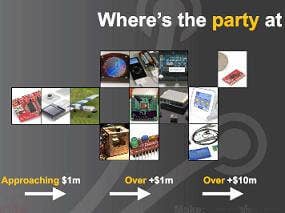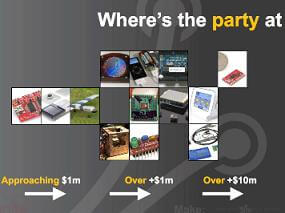13 Open Source Hardware Companies Making $1 Million or More (video)

Share
Selling products whose design anyone can access, edit, or use on their own is pretty crazy. It's also good business. At the annual hacker conference Foo Camp East this year, Phillip Torrone and Limor Fried from Adafruit Industries gave a rapid fire five minute presentation on thirteen companies with million dollar revenues from open source hardware (OSHW). Companies providing OSHW allow all designs of the products to be shared through an open license, meaning that everyone is free to download, modify, and share all the schematics and associated software. You're encouraged to make, refine, or even sell your own versions of these products. While this business model is counter-intuitive for those used to our patent and copyright loving system, Torrone and Fried estimate that the industry will reach a billion dollars by 2015. Check out their talk in the video below.
Among the OSHW baker's dozen are names that we're familiar with. We've long admired MakerBot and their 3D printing prowess, BugLabs' modular approach to electronic gadgetry is top notch, and we've seen Arduino enabled projects do some amazing things. Most of the other companies mentioned are equally interesting. What really impresses me, however, is how quickly this industry as a whole is growing. Just five years ago, there were only a handful of OSHW projects actively supported. Now there are more than 200. And these million dollar companies are still expanding.
Slides from this presentation (Million dollar baby – Businesses designing and selling open source hardware, making millions) are available in PDF.
Be Part of the Future
Sign up to receive top stories about groundbreaking technologies and visionary thinkers from SingularityHub.


Open source hardware may still be relatively new, but the open source idea is well tested in software. Linux is a definitive player in the world of operating systems, and there are hundreds (if not thousands) of open source programs of professional grade ready for you to use freely. I'm typing this article on OpenOffice right now.
At the risk of sounding hyperbolic, the open paradigm is changing the way the world works. Small businesses (and larger ones) are seeing that profits and sharing can go hand in hand. Limor and Fried's list of thirteen companies are great examples of OSHW "retailers" making an impact and growing their market. Add to that list research and development communities we've seen such as Willow Garage, ROS, OpenWetWare, Pearl Biotech, Pranav Mistry (Sixth Sense), and more. Together these groups are part of a large trend that is re-examining the way that intellectual property is managed and developed. Share your work openly and innovation is accelerated. Give your consumers rights to their goods and they will help develop them (and stay loyal to the brand). As the open source community continues to expand it may not only change the way we conceive of ownership of technology, it may also foster the growth of that technology with unparalleled success...and you still might be able to get rich while it happens.
[screen capture and video credit: Adafruit Industries]
Source: adafruit industries
Related Articles

Aging Weakens Immunity. An mRNA Shot Turned Back the Clock in Mice.

Refreshing the Brain’s Immune Cells Could Treat a Host of Diseases

Your ChatGPT Habit Could Depend on Nuclear Power
What we’re reading
